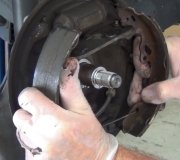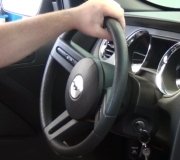There's a whole bunch of possible causes so the first thing is to identify exactly what kind of noise you're hearing. If the car has anti-lock brakes, you could be hearing a false activation. That is especially common on GM front-wheel-drive cars due to the rather wimpy signals the wheel speed sensors develop, accompanied by those signals getting even weaker when a little normal play develops in the front wheel bearings. Eventually the loss of a signal will cause the computer to set a diagnostic fault code, shut the system down, and turn on the yellow warning light to tell you.
The next thing to consider is who did the recent brake service? If you did the work yourself, there are a number of things we do to prevent noises from occurring and a number of things we can do to accidentally cause noises. The most common thing is a ridge of rust buildup on the outer edges of the rotors. Those need to be cleaned off, and are done when the rotors are machined. Next, there needs to be some high-temperature brake grease applied between the rotor and where it mounts on the hub. That eliminates a potential crunching noise when going around corners. That is more common on GM cars but it can happen on any brand. That grease must also be used on the parts the calipers slide on or are mounted to so they can move freely without making noise.
If the rotors were not machined, the new linings will take a while to wear down until they match the grooves. Noise can occur if the previous linings were worn down to the metal backing plates and chewed up the rotors. If there was any grease that got on the friction surfaces, that can cause a squealing noise, but more commonly it makes the linings rub and stuck to the rotors. That will cause a drone or moaning sound. Once the linings get hot from the first drive cycle, that grease will soak into them and into the rotors which are cast iron which is porous. The only cure for that is to replaced the linings again, and the rotors. If the grease was washed off before any of the parts got hot, it won't cause a problem.
The contact points between the pads and calipers must be cleaned with a flat file and lubricated with that high-temperature brake grease. Failure to do that can prevent the backing plates from sitting squarely against those surfaces. That can set up a noise, and the grease is needed to allow the pads to vibrate and slide freely without transmitting that noise to the calipers where it will be amplified.
Tuesday, May 12th, 2015 AT 9:35 PM


